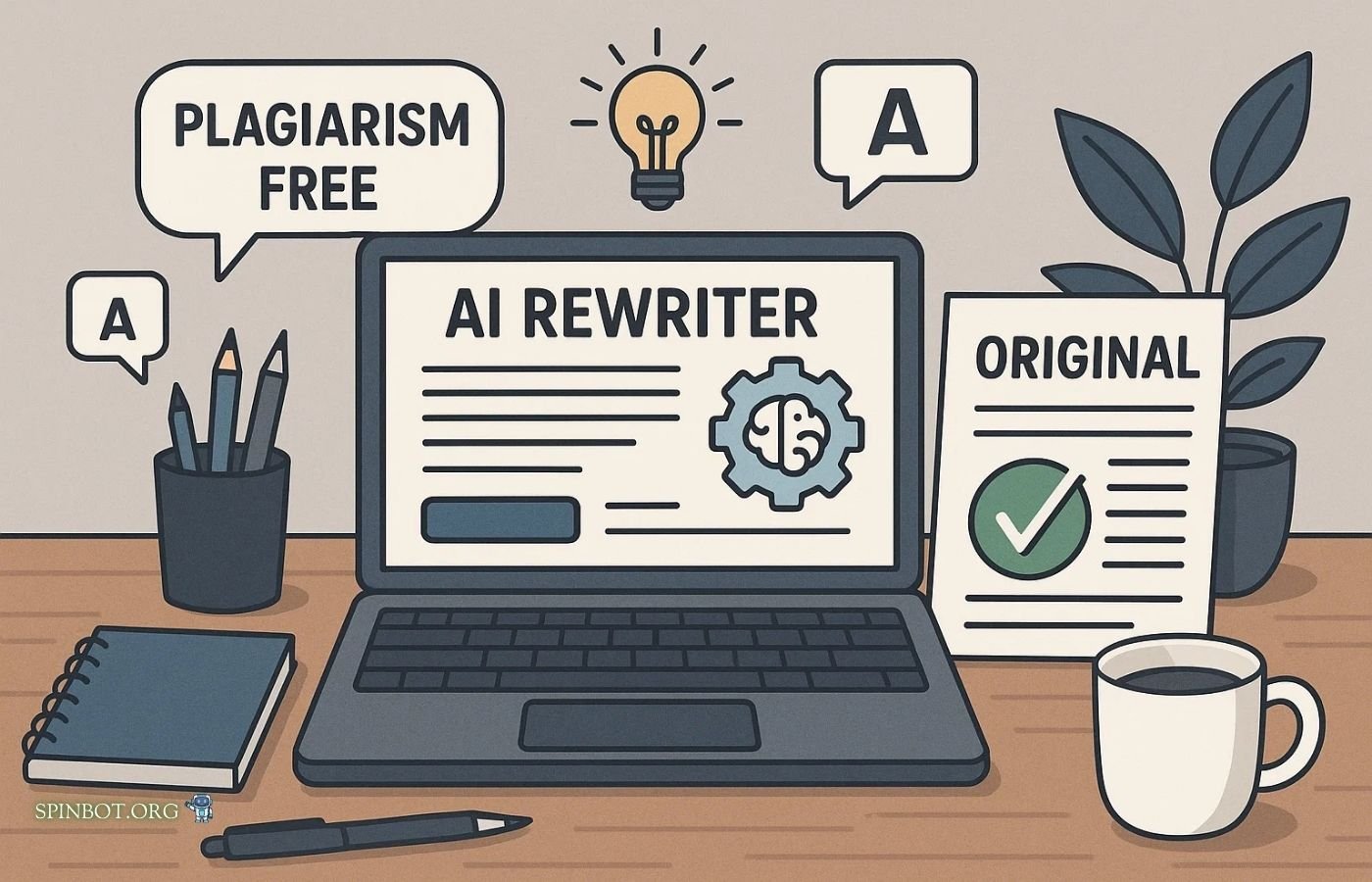In today’s digital age, content is king. But as content creation has become more accessible, plagiarism has also become a growing concern. Fortunately, the rise of Artificial Intelligence (AI) rewriters has made it easier for writers, marketers, and content creators to generate original content while avoiding the pitfalls of plagiarism. This article will explore how AI rewriters work to prevent plagiarism, their techniques, benefits, and limitations.
What is Plagiarism?
Plagiarism refers to the act of copying someone else’s work or ideas without proper acknowledgment. It can range from copying and pasting text to paraphrasing someone’s thoughts without citation. In the digital space, plagiarism is a significant concern for content creators, as search engines like Google penalize duplicate content, which can harm SEO rankings.
The Consequences of Plagiarism
- SEO Penalties: Search engines detect duplicate content and may reduce a website’s search rankings.
- Legal Repercussions: Copyright violations can lead to lawsuits, penalties, and reputational damage.
- Loss of Credibility: Using someone else’s work without acknowledgment can erode trust with your audience.
For content creators, ensuring originality is critical not only for maintaining ethical standards but also for driving web traffic and engagement.
How AI Rewriters Work
AI rewriters, also known as paraphrasing tools or content spinners, use advanced technologies such as Natural Language Processing (NLP) and machine learning to transform content while preserving its meaning. These tools help to rewrite sentences, replace words with synonyms, and restructure paragraphs to make the content unique.
Key Technologies Behind AI Rewriters
- Natural Language Processing (NLP): NLP enables machines to understand, interpret, and generate human language. It plays a crucial role in ensuring that AI rewriters can paraphrase content accurately while maintaining the original meaning.
- Machine Learning: Machine learning algorithms allow AI rewriters to improve over time, learning from vast amounts of text data to enhance their rewriting capabilities.
By leveraging these technologies, AI rewriters can significantly reduce the likelihood of plagiarism by generating content that is both unique and contextually accurate.
Plagiarism in Content Writing: A Major Concern
The rise of AI has brought about several advantages for content creation, but it also presents new challenges. Plagiarism in content writing is one such challenge. Writers often struggle to create original content while drawing from existing sources for inspiration.
How AI Rewriters Address Plagiarism
AI rewriters help avoid plagiarism by:
- Rewording sentences and paragraphs.
- Suggesting synonyms for frequently used words.
- Ensuring sentence structure is altered enough to avoid exact matches with source material.
By using these techniques, AI rewriters help content creators produce work that is distinct from the original sources, thus avoiding plagiarism.
Techniques AI Rewriters Use to Avoid Plagiarism
1. Paraphrasing Algorithms
One of the core functions of AI rewriters is paraphrasing. AI tools use paraphrasing algorithms to change the structure of sentences while retaining the original meaning. By rearranging the order of words or sentences, AI ensures that the rewritten content is not an exact copy of the original.
- Example: “AI tools can help writers create unique content by altering sentence structures while maintaining the original message.”After paraphrasing, it might read: “Writers can generate original content by modifying sentence structures, ensuring the same message is conveyed.”
2. Synonym Replacement
AI rewriters also use synonym replacement to replace words in the original content with their synonyms. This helps to avoid direct copying while preserving the content’s meaning.
- Example: The word “important” might be replaced with “crucial” or “essential,” depending on the context.
3. Sentence Restructuring
To further ensure content uniqueness, AI rewriters restructure sentences. They may change the voice of a sentence, convert active to passive voice, or break down complex sentences into simpler ones.
- Example: “The company implemented a new strategy to increase sales” could be rewritten as “A new strategy was implemented by the company to boost sales.”
4. Avoiding Exact Copying
One of the main ways AI rewriters avoid plagiarism is by ensuring that they never copy content word-for-word. Even when rewriting a piece, the goal is to present the same ideas in a completely different way.
- Example: AI might take a phrase like “The quick brown fox jumped over the lazy dog” and rewrite it as “A fast brown fox leaped over the lazy dog.”
5. Content Spinning with Variation
AI rewriters use spinning techniques to create multiple variations of the same content. This helps content creators generate a large volume of original content from a single piece while maintaining uniqueness.
- Example: A single paragraph can be rewritten in several different ways, ensuring a variety of content that is unique and plagiarism-free.
Role of Machine Learning in Plagiarism Prevention
Machine learning algorithms enable AI rewriters to improve their output continuously. These algorithms analyze vast amounts of text to learn how to create unique versions of any content. The more data the AI is exposed to, the better it becomes at generating plagiarism-free content.
- Example: Over time, AI can learn to produce more complex paraphrases, making it harder for plagiarism detection tools to flag the content as duplicate.
AI Rewriters vs. Manual Rewriting
While manual rewriting can also avoid plagiarism, AI rewriters offer several advantages. They are faster, more efficient, and can handle large volumes of content.
Advantages of AI Rewriters
- Speed: AI tools can rewrite content in seconds, saving valuable time.
- Consistency: Unlike human writers, AI rewriters maintain a consistent tone and style throughout the content.
- Scalability: AI rewriters can process hundreds of pieces of content simultaneously, making them ideal for large-scale projects.
Limitations of AI Rewriters
- Quality Control: Although AI rewriters are effective, human oversight is still essential to ensure the quality of the content.
- Complexity: Some complex content might require more nuanced rewriting, which AI may struggle with.
How AI Rewriters Ensure Content Uniqueness
AI rewriters use several techniques to ensure that content remains original:
- Plagiarism Checkers: AI rewriters often integrate plagiarism detection tools to verify the uniqueness of the rewritten content before it is delivered.
- Semantic Understanding: AI tools don’t just replace words; they understand the meaning behind the text and ensure that the rewritten content conveys the same message in a fresh way.
By utilizing these techniques, AI rewriters ensure that the final content is plagiarism-free and meets the standards set by plagiarism detection tools like Copyscape and Turnitin.
AI Rewriters in Professional Content Creation
AI rewriters are widely used by professionals in various industries, including SEO, marketing, journalism, and education. These tools help writers create high-quality, unique content quickly and efficiently.
Legal and Ethical Considerations
While AI rewriters help avoid plagiarism, it is essential to use them ethically. Content creators should ensure that the rewritten content is used in compliance with copyright laws and industry standards. AI rewriters should be used to enhance creativity, not to simply copy and modify others’ work.
Benefits of Using AI Rewriters to Avoid Plagiarism
- Efficiency: AI tools speed up the content creation process, allowing content creators to produce more content in less time.
- Cost-Effectiveness: Using AI tools is often more affordable than hiring human writers, especially for large volumes of content.
- Plagiarism-Free Content: By leveraging AI rewriters, content creators can ensure that their work is unique and avoids any plagiarism issues.
Limitations of AI Rewriters
Despite their capabilities, AI rewriters do have some limitations:
- Quality Variations: AI can sometimes produce content that lacks nuance, creativity, or coherence. Therefore, human oversight is needed to ensure the content is high quality.
- Not Perfect: Although AI rewriters reduce the chances of plagiarism, they are not foolproof. It’s always advisable to use plagiarism detection tools to double-check the content.
Future of AI Rewriters and Plagiarism Prevention
The future of AI rewriters looks promising, with continuous improvements in AI algorithms and machine learning. As these tools evolve, they will become even more adept at generating plagiarism-free, high-quality content.
- Advanced Features: Future AI rewriters may integrate even more sophisticated features, such as emotion analysis, tone detection, and content optimization for SEO.
- Greater Accuracy: With advancements in NLP and machine learning, AI rewriters will become even more accurate in creating truly unique content.
Conclusion
AI rewriters are powerful tools that help content creators avoid plagiarism by providing unique, high-quality content in a fraction of the time it would take to write manually. Through techniques like paraphrasing algorithms, synonym replacement, and content spinning, AI ensures that content remains fresh and plagiarism-free. However, while AI rewriters offer significant advantages, they still require human oversight to ensure the quality and relevance of the content.
For those looking to generate original content quickly and efficiently, AI rewriters are an invaluable resource. Whether you’re wondering how to avoid plagiarism by using AI, is rewriting with AI plagiarism, or can QuillBot avoid plagiarism, AI rewriters are a safe bet when used responsibly.

AI writing strategist with hands-on NLP experience, Liam simplifies complex topics into bite-sized brilliance. Trusted by thousands for actionable, future-forward content you can rely on.

